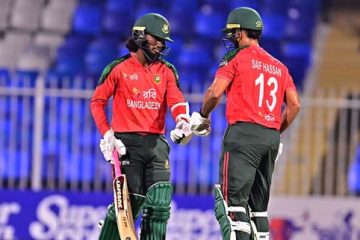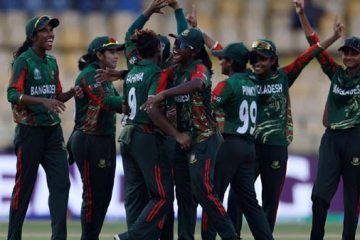Bangladesh cricket is in a strange place now. The Tigers’ winless exit from the ICC World Twenty20 should not be cause for outrage, neither can it be said that it was expected. If the emotions of a cricket-crazed nation can be pushed aside for a moment, the impression that emerges is that Bangladesh’s World Twenty20 campaign has not really revealed anything new about the country’s cricket. The old truths are still true — there is still a talented core led by the irrepressible Shakib Al Hasan, the bowlers form the weak link and mental strength, evidenced by the mindless bowling of bouncers in the last group game against Pakistan, is still an issue.
The popular adage that you learn more from defeat — an adage that seems to have found substantial currency among Bangladeshi cricketers in recent press conferences — does not seem to hold true in this regard. In fact one may churlishly argue that if it were true the Bangladesh cricket establishment should be possessors of numerous doctorates.
For a team that finishes on the losing side more often than not, rare victories provide more learning opportunities, and that precious opportunity presented itself in the Tigers’ rabble-rousing performance in the Asia Cup in March earlier this year. That performance showed that Bangladesh cricketers can perform under pressure and with the weight of expectations as they came within two runs of winning a tournament that had former world champions Sri Lanka and Pakistan and current holders India.
If ever there was a time when the iron was hot, that was it. That was the time to further cultivate those qualities of handling pressure and expectations and carry on the quite amazing momentum the Tigers had generated. What transpired however was that the only cricket Bangladesh played from then on involved T20 tours to Zimbabwe, Ireland, Netherlands and Trinidad & Tobago — not the most challenging of assignments after the highs of the Asia Cup.
On a certain level, it is understandable to fall in with the T20 bandwagon as that is the direction the cricket world is travelling — lucrative T20 leagues are popping up faster than mushrooms in dank conditions. But the game’s custodians, no matter how well-intentioned they are, should ideally look beyond the short-term.
While T20 cricket may be wildly popular and also have benefits in honing big-hitting and fielding skills, it is not an end in itself. As entertaining as it is, it does not test nor cultivate all the skills necessary to be a complete cricketer or a complete cricket team not to mention the luck factor that plays a greater role the shorter a game of cricket becomes. Therefore, playing T20 cricket for three months as preparation for a World Cup that even dewy-eyed optimists would not expect Bangladesh to win is at best misguided.
Past results bear this out — 2007 and 2010 champions India and England played none, and 2009 champions Pakistan played only one T20 match in the three-month lead-up to their triumphant campaigns.
Let us assume for the moment that success in the T20 format is the be-all and end-all of Bangladesh cricket. Even then, the aforementioned preparatory tours were akin to preparing for a swim in shark-infested waters by dipping into a swimming pool, with life-jackets.
In essence, the shortest version of cricket is a microcosm of longer versions of the game where pressure comes in short, sharp bursts. Everything then depends on how players respond. It should logically follow that players who are accustomed to overcoming pressure for long periods of time will have the calmness and presence of mind to deal with it in short bursts. Organisers in the country will not have to look beyond first-class cricket for that. Instead, they cancelled scheduled first-class games against Ireland to squeeze in more T20s.
As Shakib said in an interview recently on these pages, the state of domestic cricket is not good — it is a bad omen when a national cricketer says that there is no pressure for places. He no doubt has the best interests of Bangladesh cricket at heart and can say it because the whole world knows it to be true.
It is well past the time that Bangladesh started focusing on the longer versions of the game, for that is where progress and success lie, even though the trends and the call of the times is T20 cricket. But that is precisely why a cricket board exists — to sometimes ignore trends and think of long-term benefits. They did not strike when the iron was hot, one can only hope that it has not gone cold yet.
-With The Daily Star input




















